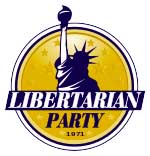Libertarian Party Candidates For The 2024 Presidential Election
After a quiet campaign season in the midst of national coronavirus restrictions, the Libertarian Party candidates for the 2020 Presidential election were whittled down to the last woman standing: Dr. Jo Jorgensen of South Carolina. But though Jorgensen appeared on all 51 ballots (including Washington DC), her Vegas election odds to actually become the next President were virtually nil. Most of the best election betting sites didn't even offer Jorgensen odds, and it's unclear whether or not LP candidates will get meaningful betting lines in the 2024 Presidential election and beyond.
To date, there have never been any Libertarian Presidents elected to lead the United States of America, but the party is a mainstay on the ballots in all US states. Unfortunately, due to its third-party politics, the Libertarian vote tends to siphon off votes for the mainstream Republican Party, with which its policies – and its voters – mostly align.
It is in this context that Vegas political bettors should view the Libertarian Party in the 2024 Presidential election and other races (like the US House and Senate elections in the 2022 Midterms, as well as gubernatorial elections every cycle), as Libertarian candidates could be the difference between a Democratic victory and a GOP win – and a big loss or a huge payout!
Top Online Sportsbooks For 2024 Vegas Election Odds Featuring Libertarian Presidential Candidates
Though only a few legal online election betting sites offered odds on Jo Jorgensen’s chances to become President in 2020, it is not out of the question that they will have more LP odds in 2024. They should also post Libertarian Party political props as the 2024 Presidential election nears.
Meanwhile, all of the best online sportsbooks offer plenty of mainstream action on Trump, Biden, and various well-known American political figures like House Speaker Nancy Pelosi and others. You can even place bets on Presidential debate props, impeachment odds, and more.
| Site | Bonus | Rating/5 | USA | Visit | |
|---|---|---|---|---|---|
| 1 |  | 50% Max $1,000 | 4.5 | Visit Review | |
| 2 |  | 50% Max $1,000 | 4.4 | VisitReview | |
| 3 |  | 50% Max $250 | 4.4 | Visit Review | |
| 3 |  | 50% Max $500 | 4.1 | Visit Review |
Jo Jorgensen - 2020 Libertarian Presidential Candidate
 The Libertarian presidential candidate for 2020 was Dr. Jo Jorgensen of South Carolina. A career activist and academic, Jorgensen has a PhD in Industrial and Organized Psychology from Clemson University (2002), where she works as a lecturer.
The Libertarian presidential candidate for 2020 was Dr. Jo Jorgensen of South Carolina. A career activist and academic, Jorgensen has a PhD in Industrial and Organized Psychology from Clemson University (2002), where she works as a lecturer.
Jorgensen previously ran as the 1996 Libertarian VP nominee after failing in her 1992 bid to take SC’s 4th congressional district under the Libertarian Party flag. Jorgensen is widely considered to be an anarcho-Libertarian, skewing even further right than the rank and file status quo of the party.
2020 Libertarian Party Presidential Election Results
Nationwide, Jo Jorgensen and the LP had a down year in 2020, earning just 1,864,720 votes for 1.2% of the total electorate (as opposed to the typical 2.5-3.5%). The party came away with zero electoral votes and is believed to have cost incumbent Donald Trump the victory in a few critical swing states.
2020 Libertarian Primary Results And Recap
The 2020 Libertarian primaries, as always, flew completely under the radar. Also as always, they were non-binding, with the winner chosen entirely by registered delegates at the Libertarian National Convention.
The 2020 Libertarian National Convention was held from May 22 through May 24, where candidate Jo Jorgensen was selected as the first-ever female Libertarian Presidential nominee. Jorgensen’s VP running mate was selected in a different vote, with podcaster and political activist Spike Cohen getting the nod.
The following candidates all received votes in the Libertarian primary elections:
- Jacob Hornberger (Virginia) – 7 wins, 9177 votes, 20.26%
- Jo Jorgensen (South Carolina) – 2 wins, 5110 votes, 11.23%
- Vermin Supreme (Massachusetts) – 2 wins, 4277 votes, 9.44%
- No Preference (N/A) – 1 win, 3760 votes, 8.30%
- Ken Armstrong (Oregon) – 0 wins, 3507 votes, 7.74%
- Kim Ruff (Arizona) – 0 wins, 3030 votes, 6.69%
- Adam Kokesh (Indiana) – 0 wins, 3865 votes, 6.32%
- Dan Behrman (Nevada) – 0 wins, 2392 votes, 5.28%
Despite being the voters’ choice and clear winner, Jacob Hornberger was not selected to go up against Donald Trump and Joe Biden in the 2020 November general election.
Speculation was rampant about why Jorgensen was chosen, though it appears the party was aware that while it must remain relevant nationally, it could not afford to put the most well-known candidate on the ballot, as the party typically cannibalizes between 3-4% of the Republican electorate.
That turned out to be a shrewd move, as Jorgensen's ticket underperformed historically, though she is still believed to have played spoiler to Trump's campaign, having an overall negative impact on Donald Trump’s reelection odds.
2024 Libertarian Party Election Odds
Right now, you will not find any Libertarian betting odds at the best election sites, as the 2024 Presidential election is a long way off, and there's no telling which candidate the LP will choose to represent the party.
That said, as the 2024 election gets closer, you may see a few odds and lines where Libertarians play a bigger part. Still, you should never expect these candidates to win. Unless, of course, The Donald himself runs on the Libertarian ticket.
To see just how long a shot the typical Libertarian Presidential candidate is, here is how Jo Jorgensen fared at the odds boards in 2020:
What Is A Libertarian?
The Libertarian definition is fairly fluid, and to define “Libertarian” across all its platforms would take a dissertation-length tome. However, there are some general views that most Libertarians share, and these are included below as the foundational principles of Libertarianism.
Libertarian Views
- Advocates for maximum individual liberty, which is upheld as the root of all valid governance
- Encourages freedom of choice both socially and economically
- Insists upon strictly voluntary association
- Is skeptical of government, authority, and state power
- Opposes all forms of governmental coercion
- Opposes outsize taxation (or even all taxation in general)
- Holds strong beliefs in laissez-faire capitalism (aka free-market capitalism)
- Advocates free trade with no restrictions
- Opposes embargoes and tariffs on foreign goods and services
- Follows the concepts of “natural law”
- Opposes governmental safety nets like welfare
- Opposes universal healthcare (aka Medicare For All)
- Promotes armed self-defense (2nd Amendment)
What Is The Libertarian Party?
 The Libertarian Party (LP) is the third largest US political party in terms of voter registration. Officially formed on December 11, 1971, in Colorado Springs, CO, the LP was born largely as a result of concerns over the Vietnam War, conscription, the Nixon administration, and the removal of the gold standard (and fiat money in general, which is why you should always bet on politics using Bitcoin or another cryptocurrency!).
The Libertarian Party (LP) is the third largest US political party in terms of voter registration. Officially formed on December 11, 1971, in Colorado Springs, CO, the LP was born largely as a result of concerns over the Vietnam War, conscription, the Nixon administration, and the removal of the gold standard (and fiat money in general, which is why you should always bet on politics using Bitcoin or another cryptocurrency!).
The Libertarian beliefs cited above are typically more broad than Libertarian Party beliefs, simply because the Libertarian Party attempts to be a catch-all and a compromise between different kinds of Libertarian thought.
Many analysts have called the modern Libertarian Party a classical liberal party as opposed to the Progressive Democrat Party of today. In general, the LP agrees more with Democrats on social issues (though not social justice issues) and more with Republicans on fiscal or financial issues.
For a more specific comparison between Libertarians and today’s Democrats and Republicans, see below.
Libertarian Vs. Liberal
In terms of the application of Big Government, liberals and Libertarians couldn’t be farther apart on the issues. Democrats and liberals in general advocate for more laws, more restrictions, and parallel constitutions based on socioeconomic and ethnic classes.
Libertarians would rather see each person – regardless of background or circumstance – afforded the maximum freedom to sink or swim on their own sans the government safety net.
However, Libertarians do share some similarities with liberals on issues like gay marriage, abortion rights, and a reduction in the US police state.
Liberals are historically less likely to become Libertarians than conservatives are, though for many voters with independent politics who share overlapping views, Libertarianism can be compelling.
Libertarian Vs. Conservative
If you’re confused about Libertarian vs. Republican (or conservative) policies, you’re not alone. Most Libertarian views echo Republican sentiment, though there are some key differences.
While many of their goals are the same (i.e. reduced taxation, reduction in the welfare state, more open trade policies, and adherence to gun rights for all Americans), there are also some big differences.
Libertarians oppose foreign wars of all kinds and call on the US military to be a purely defensive national institution. Further, most Libertarians wish to abolish most taxes in a way that entrenched Republicans cannot allow.
Socially, Libertarians are more centrist or even leftist, though they do not support special laws for minority classes, instead advocating for laws that draw (or might draw) any economic, racial, or cultural distinctions to be eliminated altogether.
